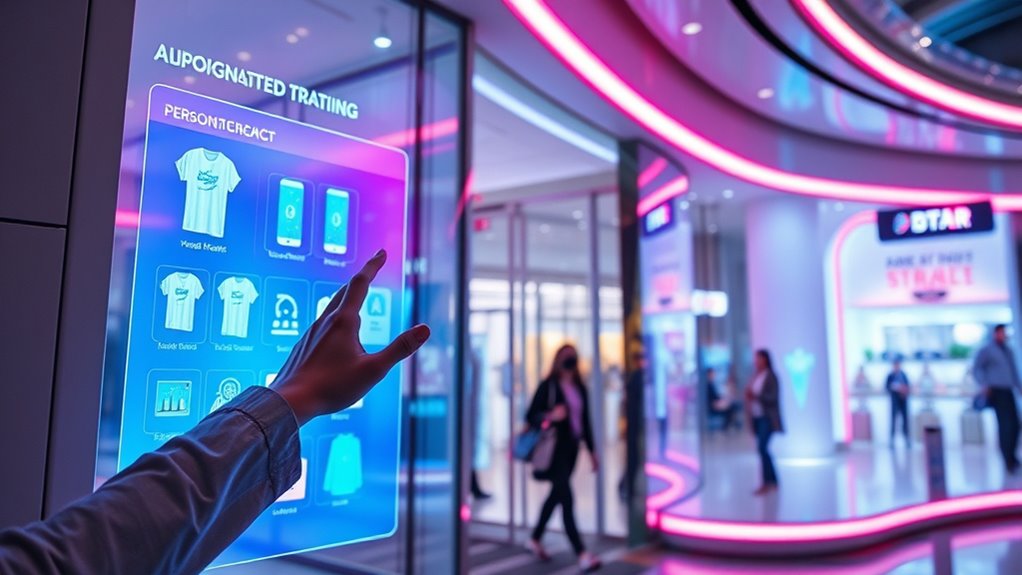AI is transforming online shopping by making storefronts smarter, more personalized, and easier for you to navigate. It uses data to give tailored recommendations, helping you find products faster and discover hidden gems beyond familiar brands. Conversational AI like chatbots guide your decisions and resolve queries smoothly, reducing frustration. This shift creates a more engaging and efficient shopping experience that adapts to your needs, and if you keep exploring, you’ll learn all the innovative ways AI is shaping your online store experience.
Key Takeaways
- AI personalizes storefronts through tailored recommendations and filtering, making browsing more relevant and efficient.
- AI-powered search engines help shoppers discover products across unfamiliar brands quickly.
- Dynamic AI-driven interfaces adapt to user behavior, improving navigation and product discovery.
- Virtual assistants and chatbots enhance engagement, answer queries, and guide purchasing decisions.
- Overall, AI transforms online storefronts into more intuitive, customer-centric shopping environments.

AI is transforming online shopping by making the experience faster, smarter, and more personalized. As a shopper, you now benefit from tailored recommendations, streamlined searches, and smarter product discovery. Nearly 60% of consumers have used AI to help shop, showing how central AI has become in guiding your buying journey. Whether you’re browsing for fashion, electronics, or niche products, AI-powered engines help you find what you want quickly, even when you’re exploring unfamiliar brands or categories.
If you’re a frequent shopper, you probably rely on AI assistants like ChatGPT to inform your decisions. About 66% of those who shop more than once a week use AI to evaluate options, compare prices, and discover new products at the start of their shopping process. This initial discovery stage is essential; AI helps you uncover hidden gems and expands your options beyond familiar brands. Generative AI traffic for shopping surged 1,300% year-over-year, especially during peak sales like Cyber Monday, showing how AI-driven discovery is accelerating. AI actively empowers consumers with personalized recommendations, sophisticated questions, and rapid answers, transforming passive browsing into active engagement. Additionally, AI’s ability to analyze large datasets enhances personalized filtering, ensuring you see options that truly match your preferences.
AI also enhances your navigation through large online catalogs. Personalized filtering and search capabilities cut down on frustration, helping you locate deals, specific styles, or unique products effortlessly. For instance, AI’s ability to recommend niche items broadens your choices and supports new product launches, making online stores more dynamic and responsive to your needs.
Moreover, AI-powered storefronts aren’t just about discovery—they’re about engagement. Chatbots and conversational AI agents act as your virtual shopping assistants, resolving queries, suggesting products, and guiding you toward purchases. With a 12.3% conversion rate for AI chatbots, they’re effective at closing sales and speeding up decision-making. AI’s influence reduces abandoned carts and encourages larger orders, with returning customers spending 25% more when assisted by these tools.
In essence, AI is reshaping the very foundation of online stores, making them more intuitive and customer-centric. It’s not just about technology; it’s about creating a shopping experience that’s faster, more personalized, and easier to navigate. As AI continues to grow, so will your ability to shop smarter, more efficiently, and with greater confidence.
Frequently Asked Questions
How Does AI Personalize Product Recommendations in Real-Time?
You get personalized product recommendations in real-time by AI analyzing your explicit feedback like ratings and reviews, along with implicit signals such as clicks and time spent browsing. It cleans and processes this data continuously, extracting key interaction metrics. The system then uses advanced algorithms to predict what you’ll like, updating suggestions dynamically during your session, ensuring a tailored shopping experience that adapts to your behavior instantly.
What Are the Privacy Implications of Ai-Driven Storefronts?
They say “trust takes years to build, seconds to break,” and AI-driven storefronts can jeopardize that trust. You might collect more personal data than customers expect, risking privacy breaches and legal penalties if you don’t comply with regulations like GDPR and CCPA. Misusing data or lacking transparency can lead to lost trust, damaged reputation, and potential security threats. Ensuring privacy protections, transparency, and responsible AI use keeps customer trust intact.
How Accessible Are Ai-Powered Shopping Experiences for All Users?
AI-powered shopping experiences are becoming more accessible, but they still have gaps. You might find features like voice assistants, screen readers, and personalized interfaces helpful, especially if you have disabilities. However, inconsistencies exist because not all retailers integrate these tools well, and some systems don’t meet accessibility standards. To guarantee full accessibility, demand inclusive design and choose platforms committed to accommodating diverse needs.
Can Small Businesses Implement AI Storefronts Cost-Effectively?
Yes, small businesses can implement AI storefronts cost-effectively by leveraging affordable, cloud-based AI services and subscription models. You can start with basic applications like chatbots or product recommendations, which require lower investments. Using pre-built APIs and sharing costs through strategic partnerships helps reduce expenses. Keep in mind, initial setup costs may include infrastructure upgrades and training, but these can be minimized with scalable, usage-based solutions that grow with your business.
What Future AI Innovations Are Expected in Online Retail?
Imagine browsing a store where every product seems to understand you, guiding you effortlessly. Future AI innovations will make online retail even smarter: hyper-personalized shopping assistants that anticipate your needs, immersive virtual try-ons that feel real, and predictive analytics that stock exactly what you’ll buy. Voice commerce will become seamless, and AI-driven experiences will deepen customer relationships, making shopping more intuitive, emotional, and satisfying than ever before.
Conclusion
As you explore this new shopping era, imagine how AI personalizes every interaction. Did you know that 80% of consumers are more likely to purchase from brands offering tailored experiences? With AI reshaping storefronts, you’re at the forefront of a smarter, more intuitive shopping world. Embrace these innovations, and you’ll find your online shopping not just easier, but truly personalized to your needs. The future of retail is just a click away.








